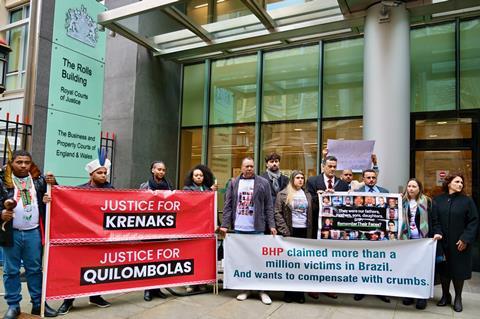The latest case management hearing in the multi-billion-pound lawsuit against global mining giant BHP, over a dam collapse that led to one of Brazil’s worst environmental disasters, saw an application to amend re-amended particulars of claim refused.
The Fundão dam, in Minas Gerais, Brazil, collapsed in 2015 releasing some 40 million cubic metres of tailings from iron ore mining. The collapse and flood killed 19 people, destroyed villages and had a ‘widespread impact’ on individuals and communities, the claimants say.
Claimants in the group action, one of the largest in English history, include more than 700,000 individuals, 1,600 businesses, 78 churches and faith-based institutions, 46 municipalities, seven utility companies and members of the Krenak indigenous community and Quilombola community.
The dam was owned and operated by Samarco Mineração, a joint venture between BHP and Brazilian iron ore mining company Vale. BHP’s liabilities in the class action were estimated at £5bn in 2018.
The court this week heard applications including amendments to the re-amended master particulars of claim following a judgment earlier this year which refused permission for variations of a paragraph ‘on the basis it did not plead with sufficient particularity the nature of the case’.

Mrs Justice O’Farrell said yesterday: ‘The application before the court today is the revised variation of paragraph 196a which in essence sets out a general allegation that BHP was extensively involved in Samarco operations. There is then set out a list of the category of meetings, telephone calls, site visits, reports seen and received and other communications including emails in which it is said that the claimant can demonstrate extensive involvement in the operation of Samarco.’
The application was opposed by both BHP and Vale, which claimed the proposed amendments, described as a ‘belt and braces approach’ by the claimants, were not ‘specifically clear’.
The judge said it was ‘clear the claimants do not simply rely on attendance in the meetings or receipt of reports of communication with specific individuals’ but it was ‘unclear from that list of various documents as to what it is said about the involvement beyond mere attendance that gives rise to the strict liability’.
Refusing the application, the judge said the pleading did not identify ‘with any particularity, the conclusions of findings the court would be invited to draw from those matters’.
She added: ‘The case that BHP has to meet is still not set out with specific particularity so as to enable it to know the case it has to meet. For that reason, leaving aside consequential difficulties this would impose on the timetable, the court refuses the application.’
The trial is currently scheduled for October. The listing has been increased from 11 to 14 weeks ‘to deal with all the evidence’ while oral closing submissions would be listed to a ‘date to be fixed’.
The case management hearing, listed for two days, continues.
This article is now closed for comment.



























5 Readers' comments